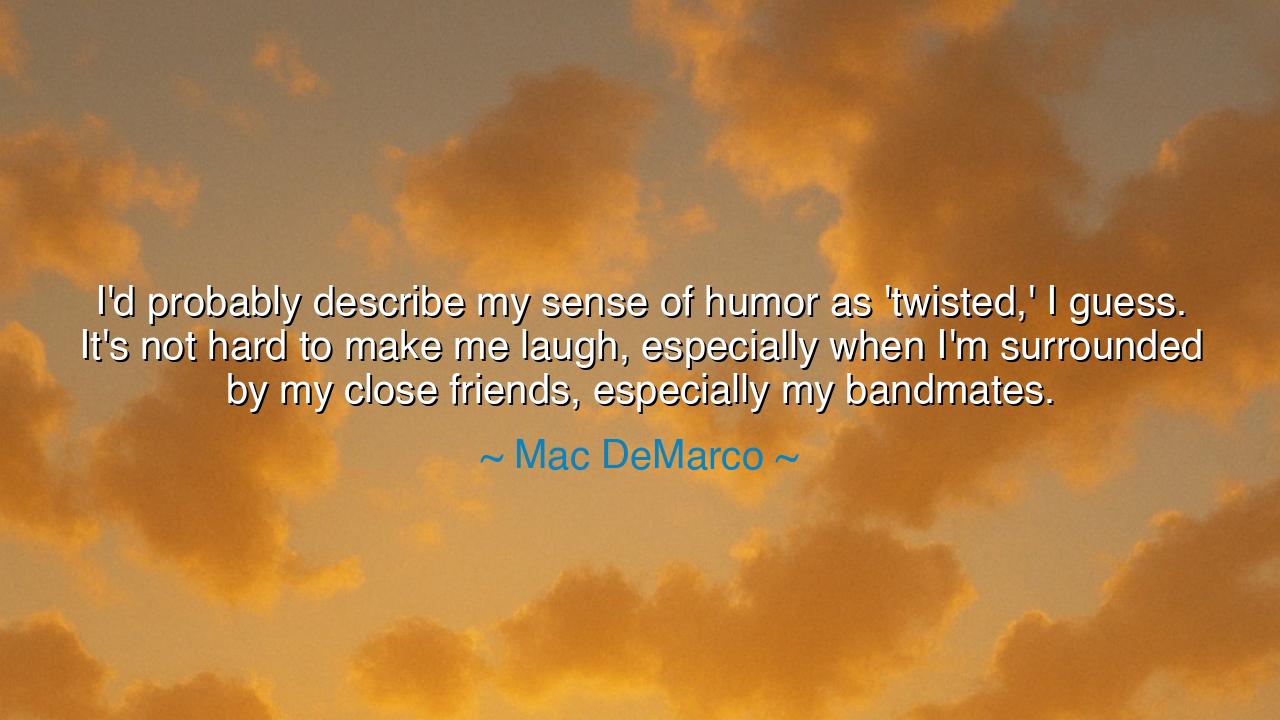
I'd probably describe my sense of humor as 'twisted,' I guess.
I'd probably describe my sense of humor as 'twisted,' I guess. It's not hard to make me laugh, especially when I'm surrounded by my close friends, especially my bandmates.






"I'd probably describe my sense of humor as 'twisted,' I guess. It's not hard to make me laugh, especially when I'm surrounded by my close friends, especially my bandmates." These words spoken by Mac DeMarco reveal a truth about the nature of humor—that it is often shaped by the people with whom we surround ourselves, and that the humor that makes us laugh the most is sometimes the most unexpected and unconventional. DeMarco’s description of his humor as "twisted" speaks to the idea that humor is not always clean, straightforward, or predictable. Sometimes, humor emerges from the absurd, the irreverent, and the dark, and it is in these moments that we find ourselves laughing not out of conventional joy, but out of an understanding of life's imperfections and contradictions.
In the ancient world, the best thinkers and artists often understood that humor was not a tool for mere entertainment, but a way of reflecting on the human condition. Aristophanes, the master of Greek comedy, was known for using twisted humor—humor that was sharp, uncomfortable, and sometimes dark—to reveal the flaws and hypocrisies of society. His plays were filled with moments of absurdity and irreverence, and he never shied away from challenging the norms of his time. Aristophanes understood that humor had the power to disrupt the status quo and to expose the absurdity of life’s contradictions. DeMarco, in his own way, continues this tradition by embracing humor that is unconventional, recognizing that the funniest moments often arise when we step outside the bounds of what is traditionally considered "acceptable."
Consider the story of Diogenes, the Cynic philosopher of ancient Greece, who used humor and absurdity to challenge the social norms of his time. Diogenes lived without possessions, without luxury, and he often used humor to expose the contradictions of the wealthy and powerful. His behavior was often bizarre, and he engaged in acts of irreverence to make people question their assumptions about the world. One of his most famous acts was walking through the streets of Athens during the day with a lantern, claiming to be looking for an honest man. This act, while humorous in its absurdity, was also a powerful critique of the moral emptiness Diogenes saw in society. Like DeMarco, Diogenes found humor in the twisted aspects of human existence, and in doing so, he challenged others to reflect on their own assumptions.
In more recent times, Mark Twain embodied a similar approach to humor, using his sharp wit and irreverence to make fun of the hypocrisies of society. Twain’s humor, like DeMarco’s, was often twisted—it did not shy away from the darker aspects of life. In The Adventures of Huckleberry Finn, Twain used humor to address the absurdities of race and social injustice in a way that was both deeply thought-provoking and incredibly funny. Twain’s humor, much like DeMarco’s, emerged from a place of deep awareness of the world’s flaws, and in that awareness, he found laughter. Twain understood that humor was a way to confront the uncomfortable truths of life without losing one’s humanity or joy. It was the humor that allowed him to navigate the darkness of the world while still finding light in the chaos.
The lesson in DeMarco’s words is one of embracing the unconventional, the absurd, and the unexpected. Humor, when it comes from a place of honesty and awareness, can be a powerful tool for connecting with others, especially those who understand the shared absurdities of life. When we surround ourselves with people who see the world through a similar lens, humor becomes a form of unity, a way of navigating the complexities of life together. Just as Aristophanes and Twain used humor to reflect on the contradictions of society, so too does DeMarco use humor to find meaning in the chaos of his own experiences. It is not always about fitting into societal expectations but about finding connection in the irony of it all.
In our own lives, we are often confronted with dilemmas and challenges that seem too heavy to bear. But humor, especially when it is twisted and unexpected, provides us with the strength to endure. It is through laughter that we find our freedom, not from the pain itself, but from the burden it imposes on our spirit. So, when you find yourself in the company of friends, in moments of struggle or joy, allow yourself to laugh at the absurdities of life. Embrace the humor that emerges from your shared experiences, no matter how twisted or unconventional they may seem. In this way, you will find a deeper sense of connection with others and a deeper peace within yourself.
So, dear listener, take this wisdom to heart. Laugh at the world’s contradictions, at its irony, and at the moments that seem too strange to understand. Find joy not in perfection, but in the twisted, the unexpected, and the raw aspects of life that make us human. Like DeMarco, like Aristophanes, and like Mark Twain, allow your humor to reflect your honesty, your awareness, and your willingness to confront the world’s flaws with both grace and laughter. In doing so, you will not only bring lightness to your own life but also offer others the gift of shared understanding and connection in a world that can often seem far too serious.






AAdministratorAdministrator
Welcome, honored guests. Please leave a comment, we will respond soon